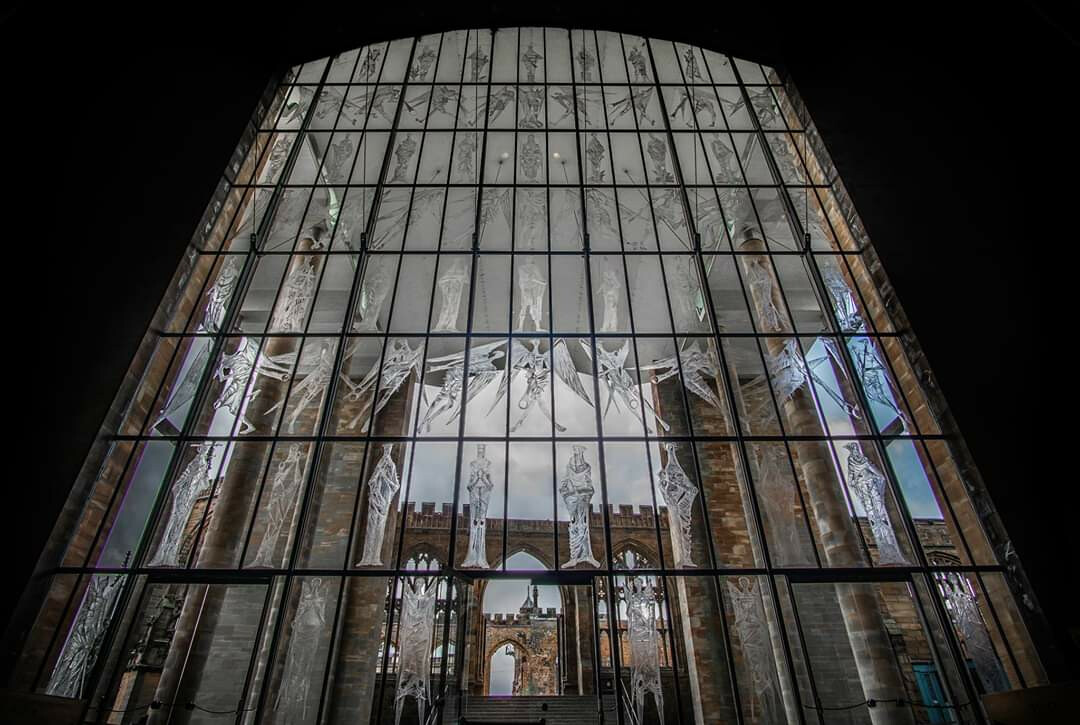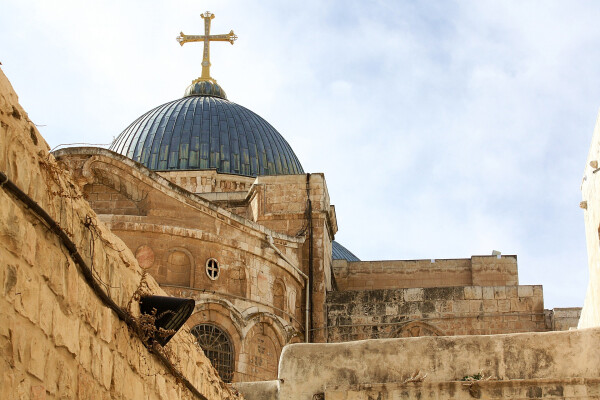 'Screen of Saints and Angels' at Coventry Cathedral, by John Hutton (1906 - 1978). Photo by Tara Rutledge - Own work, CC BY-SA 4.0, https://commons.wikimedia.org/w/index.php?curid=86592537
'Screen of Saints and Angels' at Coventry Cathedral, by John Hutton (1906 - 1978). Photo by Tara Rutledge - Own work, CC BY-SA 4.0, https://commons.wikimedia.org/w/index.php?curid=86592537
Dear Theologian,
What is meant by “the communion of saints”? Every time I recite the Apostles’ Creed at Morning Prayer, I say that I believe in it, but I am vague about its meaning. Is this an important doctrine? And does it have any bearing on my own life of Christian faith?
Looking for Enlightenment
Dear Looking,
Let’s start with the word “saints.” We don’t ordinarily apply this word to ourselves, since it seems to affirm a higher degree of holiness than we dare to claim. But it is a surprising fact that in the New Testament this word refers to all Christians. (Rom 1:7, 1 Cor 1:2)
This usage reflects the conviction that all those who belong to Christ through faith and baptism are called to be powerfully transformed by the Holy Spirit into the image of Christ. They are not necessarily morally better than other people, but they are involved in a process of being made holy, no matter how far they may be from reaching the goal (Phil 3:12-14).
What is meant, then, by the communion of saints? The word “communion” translates the Greek word koinonía, which means fundamentally “a common sharing in” something. It can also be translated by the word “fellowship.” For Christian faith, what the “saints” share in is Christ. So in the New Testament, koinonía is the word used for the community of believers. What they have in common is the crucified and risen Lord who lives in them by the power of the Holy Spirit. “God is faithful; by him you were called into the fellowship of his Son, Jesus Christ our Lord.” (1 Cor 1:9; see also Acts 2:41-42 and 1 Jn 1:3.)
This “fellowship” or “communion” involves the participants in a relationship of mutual love and solidarity.
“As God’s chosen ones, holy and beloved, clothe yourselves with compassion, kindness, humility, meekness, and patience. Bear with one another and, if anyone has a complaint against another, forgive each other; just as the Lord has forgiven you, so you also must forgive. Above all, clothe yourselves with love, which binds everything together in perfect harmony.” (Col 3:12-14; see also Rom 12:9-10.)
This unique fellowship unites people of very different backgrounds, across all boundaries of race, class, or gender. It is not a matter of uniformity, but rather of “diversity in communion.”
“…in Christ Jesus you are all children of God through faith. As many of you as were baptized into Christ have clothed yourselves with Christ. There is no longer Jew or Greek, there is no longer slave or free, there is no longer male and female; for all of you are one in Christ Jesus.” (Gal 3:26-28; See also Col 3:11-12.)
Furthermore, as the Church has come to believe, this communion of people “in Christ” is not broken even by death. There is a spiritual unity of the living with all those who have gone before them in faith. The great fellowship extends beyond all boundaries of time or place, to include all those who have been or ever will be gathered into Christ.
Is the communion of saints an important doctrine of Christian faith? Rightly understood, it is central. St. Paul considered that the “mystery” of God’s eternal purpose for mankind was revealed precisely in the joining together of Jews and Gentiles into one new community.
“In former generations this mystery was not made known to humankind, as it has now been revealed to his holy apostles and prophets by the Spirit: that is, the Gentiles have become fellow heirs, members of the same body, and sharers in the promise in Christ Jesus through the gospel.” (Eph 3:5-6; see also Eph 2:11-22.)
Does the doctrine of the communion of saints have any bearing on your own life of Christian faith? Here are some considerations to ponder.
The life of faith that you live is really a participation in the communion of saints. To belong to Christ is to belong to his Body, the Church. If you let your living be illuminated by this truth, you will value highly your participation in the “fellowship” of the Church in various ways (liturgical worship, education, service, social interaction). You will not think of your personal spirituality as utterly private, but rather as a sharing in a great communal process of “formation” and indeed of “transformation” in Christ.
You will find strength and encouragement in the many witnesses who have lived the faith before your time. (Heb 12:1) You will also be strengthened by the good example of so many other people now living, in whom the mystery of Christ is “bodied forth.”
And when you experience the death of people whom you have loved, your faith in the communion of saints will sustain you. The sharing in Christ which we have known together is not ended by death.
One final point: When we experience the joy and blessedness of sharing in the communion of saints, we desire to include others in that fellowship. We are motivated to be missionaries and apostles. This is well expressed in the First Letter of John:
“We declare to you what we have seen and heard, so that you also may have fellowship with us; and truly our fellowship is with the Father and with his Son Jesus Christ. We are writing these things so that our joy may be complete.” (1 Jn 1:3-4)
Faithfully,
The Theologian
The Rev. Dr. Wayne L. Fehr wrote a column for a previous version of the diocesan newsletter called Ask a Theologian. He answered questions from ordinary Christians trying to make sense of their faith. Now he's back with a monthly column once again. You can find and purchase his book on Tracing the Contours of Faith: Christian Theology for Questioners here.



 'Screen of Saints and Angels' at Coventry Cathedral, by John Hutton (1906 - 1978). Photo by Tara Rutledge - Own work, CC BY-SA 4.0,
'Screen of Saints and Angels' at Coventry Cathedral, by John Hutton (1906 - 1978). Photo by Tara Rutledge - Own work, CC BY-SA 4.0, 